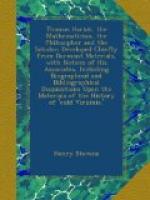Among the manuscripts in the handwriting of Hariot in the British Museum (Add. 6789) are these samples of ingenious trifling. No evidence is forthcoming that he was ever a married man, but that he occasionally let himself down from pure mathematics and high philosophy and amused himself with anagrams is plain enough. Here are a few specimens on his own name.
ANAGRAMS ON THOMAS HARIOTUS
Tu homo artis has traho hosti mufa
Homo has vt artis O trahit hos mufa
Homo hasta vtris oh, os trahit mufa
vitus oho trahit mifas
rutis oho, trahis mutis
Humo astra hosti oho, fum Charitas.
If the pertingent Reader still craves more evidence of the extent of Hariot’s friendships, and the universality of his acquirements, let him read the following pithy, quaint, and beautiful tribute paid to him by blind Old Homer’s Chapman in 1616. It is found in the Preface to the Reader in the first complete edition of Homer’sworks translated by George Chapman, London [1616], fo.
No coference had with any one liuing in al the noueltiet I prefume I haue found. Only fome one or two places I haue fhewed to my worthy and moft learned friend, M. Harriots, for his cenfure how much mine owne weighed: whofe iudgement and knowledge in all kinds, I know to be incomparable, and bottomlefle ; yea, to be admired as much, as his moft blameles life, and the right facred expence of his time, is to be honoured and reuerenced. Which affirmation of his cleare vnmatchednefle in all manner of learning; I make in contempt of that naftie objection often thruft vpon me ; that he that will iudge, muft know more then he of whom he iudgeth ; for fo a man fhould know neither God nor himfelf. Another right learned, honeft, and entirely loued friend of mine, M. Robert Hews, I muft needs put into my confest conference touching Homer, though very little more than that I had with M. Harriots. Which two, I proteft, are all, and preferred to all.
It remains to say two words more about Baron Zach’s’ discovery’ of the Hariot papers at Petworth in 1784. This remarkable story has been told many times, in many books, and in many languages. It has found its way into many modern dictionaries and grave encyclopædias, but it always appears with an unsatisfactory and suspicious flavor. Dr Zach’s ’ discovery’ is found cropping up all over the continent, and everywhere is made paramount to Hariot’s papers, while Oxford is blamed for not giving the young German his dues!




